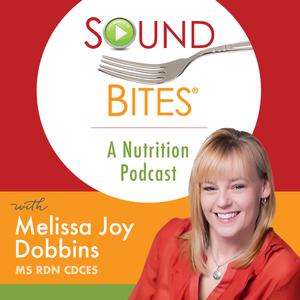
Sound Bites A Nutrition Podcast
Melissa Joy Dobbins, MS, RD, CDE
Delving into the science, psychology and strategies behind good food and nutrition
- 38 minutes 30 seconds278: Diabetes: 7 Healthy Eating Patterns & Key Factors Beyond Food – Stacey Krawczyk
There are many essential aspects of diabetes management, but it’s no surprise that one of the most common questions people have about diabetes is “What can I eat?” The American Diabetes Association’s nutrition philosophy is: “informed food choices are essential for living well” and there are 7 key meal patterns as well as the Diabetes Plate to help guide food choices. However, food is more than just simply nutrients – it plays an important role in our culture, communities and celebrations – and it’s only one of many factors that influence our health.
Tune into this episode to learn about:
● seven key meal patterns for managing diabetes
● the Diabetes Plate and who might benefit from using it
● the ADA’s new sister organization focused on obesity
● the ADA’s approach to “food as medicine”
● diabetes distress and how it impacts behaviors and outcomes
● fasting and diabetes
● including cultural and celebratory foods into healthy meal patterns
● lifestyle factors beyond food
● benefits of medications
● GLP-1s for diabetes vs weight management
● important takeaways and resources for the public and health professionals
Full shownotes, transcript and resources: https://soundbitesrd.com/278
23 January 2025, 10:00 am - 50 minutes 50 seconds277: Weight & Health: Can Kids Thrive at Any Size? – Jill Castle
Many parents feel enormous pressure to raise fit, slender children. According to the CDC, approximately 1 in 5 U.S. children and adolescents aged 2-19 have obesity, and approximately 4.1% were classified as underweight (in 2017-2018). As overweight and obesity rates are increasing, so are weight bias and stigma, especially regarding kids and teens. The “health at every size” movement and “anti-diet” approaches are becoming more popular – but can children really be healthy at any size? Is adopting healthy lifestyle behaviors truly an effective solution?
Tune into this episode to learn about:
● what people get wrong about children with overweight or obesity
● the key to helping kids with larger or smaller sized bodies
● how to get beyond the basic advice and utilize practical strategies
● the 8 pillars of wellness
● the “learner, striver, thriver” concept
● what a family manifesto is and why it is important
● how to build intrinsic motivation
● fostering a healthy relationship with food
● addressing fears of your child overeating or undereating
● the spectrum of appetite traits in children
● minimally nutritious food and food shaming
● cultivating a “safe media diet”
● how this book is different from other child health and weight-focused books
● important takeaways and resources for the public and health professionals
Full shownotes, transcript and resources: https://soundbitesrd.com/277
7 January 2025, 10:00 am - 56 minutes 38 seconds276: Adolescent Health: Nutrient Needs, Research Gaps & Future Dietary Guidance
It's well-established that nutrient adequacy in adolescence affects physical development and academic performance, as well as long-term health – yet research is woefully lacking for this life stage and dietary guidance lacks specificity for these unique needs. In fact, the 2020 Dietary Guidelines for Americans noted that the nutrient gaps among adolescents are so significant, that this “constellation of potential nutritional risk factors” is a public health challenge. To help address this gap, the National Cattlemen’s Beef Association, on behalf of the Beef Checkoff, partnered with Dr. Mario Ferruzzi and his team at the Arkansas Children’s Nutrition Center, one of 6 USDA national nutrition centers, to convene 50 leading nutrition scientists, physicians, registered dietitians, and public health experts. This podcast episode is a result of conversations with many of the esteemed experts who presented there.
This podcast episode is sponsored by The National Cattlemen’s Beef Association (NCBA), a contractor to the Beef Checkoff.
Full shownotes, transcript and resources at: https://soundbitesrd.com/276
11 December 2024, 10:00 am - 46 minutes 4 seconds275: Cancer Risk Reduction: New Research on Fruits and Vegetables – Ginger Hultin
Commercial support for this podcast has been provided by Avocados – Love One Today®
Cancer is a complex disease that is influenced by many factors including genetics, environment, and lifestyle behaviors. According to the World Cancer Research Fund, emerging evidence suggests that people who eat very little or no fruits and vegetables are at the greatest risk for developing certain cancers. In this episode, we explore the relationship between lifestyle behaviors and cancer risk, highlight current research on diet and cancer risk reduction including new research related to avocado consumption and cancer, as well as strategies to help increase fruit and vegetable consumption and other habits that help to mitigate cancer risk.
Tune into this episode with Ginger Hultin, MS, RDN, CSO to learn about:
● Gaps in awareness about the link between diet and cancer
● New research about cancer prevalence and risk factors
● Challenges and limitations in cancer/nutrition research
● Risk reduction vs. “prevention”
● Why fruits and vegetables are beneficial for cancer risk reduction
● New research on avocado consumption and cancer risk
● Nutrient profile of avocados and how that relates to cancer risk reduction
● Tips for healthcare providers to help patients reduce their risk of cancer
● Tips and tricks for eating more fruits and vegetables
● Resources for health professionals and the public
This episode has been approved by CDR for 1.0 free CEUs for RDNs & NDTRs
Listen on any podcast app or here where you can get the full shownotes, transcript and resources: https://soundbitesrd.com/275
4 December 2024, 10:00 am - 45 minutes 19 seconds274: Fun Snack Trays Help Encourage Healthy Eating Habits – Frances Largeman-Roth
Charcuterie boards have become very popular and are certainly a fun way to entertain guests – but did you ever think this creative concept might be a solution to healthy eating? Snack trays can be a fun way for kids and adults alike to explore new foods and flavors while making snack time (and even mealtime) less stressful and definitely more playful. This approach to feeding your family - or friends - encourages a healthy relationship with food, can help fill nutrient gaps, and can decrease food waste, too!
Tune in to this episode with Frances Largeman-Roth, RDN, to learn about:
· Snacking trends
· Child nutrition insights
· Why some parents are so stressed about feeding their kids
· How a snack tray helps people try new foods
· The “rules” of snack trays (hint: there are none!)
· Practical tips for building a tray
· Tips for a balanced, nutritious tray
· The difference between a snack tray and meal tray
· Considerations for building trays for young children
· Building a healthy relationship with food
· Some seasonal, celebration tray examples
· Recipes to enhance your snack trays
Full shownotes, transcript and resources at: https://soundbitesrd.com/274
20 November 2024, 3:53 pm - 56 minutes 56 seconds273: Soy Foods: Navigating 4 Major Myths Using Research – Jill Castle & Karen Collins
Despite the extensive research available, there remains significant confusion amongst consumers regarding the health effects of soy on various population groups. In this episode, we delve into several misconceptions and examine the latest scientific findings on contentious issues including the relationship between soy and breast cancer, the impact of vegetable oils on cardiovascular disease risk, and the role of processed soy products in the diet.
Tune in to this episode with guests Jill Castle, MS, RDN and Karen Collins, MS, RDN, CDN, FAND to learn about:
· Four pervasive myths surrounding soy foods
· Sensational headlines regarding seed oils, breast cancer, hormones and processed foods
· Consumer and health professional insights about each myth
· Current research on each myth
· Practical takeaways and helpful resources for the public and health professionals
Full shownotes, transcript and resources at: https://soundbitesrd.com/273
7 November 2024, 10:00 am - 1 hour 32 seconds272: The Power of Pulses: Nutritious, Delicious, Versatile, Affordable & Sustainable – Tim McGreevy & Chelsea LeBlanc
Pulses are the nutritionally dense, dry edible seeds of legumes including dry peas, beans, lentils and chickpeas. They are high in fiber, folate, potassium and plant protein, and contain several micronutrients such as iron and zinc. While many people may not be familiar with the term “pulses”, chances are they are familiar with the food itself. Nutritious, versatile and affordable, pulses are also a climate-friendly crop. This episode dives into all things pulses with a farmer/agricultural economist and a registered dietitian nutritionist.
Tune in to this episode to learn about:
· what pulses are
· what the difference is between pulses and legumes
· why chickpeas are also called garbanzo beans
· current intakes vs. recommended intakes
· the nutritional profile of pulses
· benefits of pulses beyond nutrition
· tips for preparing pulses
· swaps and recipes to try
· what makes pulses a climate-friendly crop
· what benefits farmers experience by incorporating pulse crops into their rotation
· the Coalition for the Advancement of Pulses
· current research, takeaways and infographics
· resources for the public and health professionals
Full shownotes, transcript and resources at: https://soundbitesrd.com/272
23 October 2024, 9:00 am - 1 hour 10 minutes271: Improving Digital Health Literacy: Influencers, Misinformation & Leveraging Credibility – Dr. Theo Lynn
New health, nutrition and weight loss trends are popping up daily on social media. Many of these fly-by-night trends are simply that, but a new study focusing on the platform TikTok found that these trends may have more of a hold on people than once thought.
To expose the inaccurate information being extracted from TikTok, MyFitnessPal, the #1 nutrition and food tracking app, partnered with Dublin City University on a two-part research project called “Health and Nutrition Inaccuracies on TikTok”. Part 1 looked at social media influencers and Part 2 looked at Gen Z TikTok users. Study findings ranged from determining that only about 2% of content being classified as accurate to Gen Z users trusting influencers more if they claim to be qualified dietitians.
Tune in to this episode to learn about:
· how and where Americans are getting their health information has changed
· improving our digital literacy is necessary to make better choices
· MyFitnessPal’s ‘Nutrition IQ’ surveys’ key themes and concerning statistics
· the Dublin City University 2-part research study
· why the study focused on TikTok vs other platforms
· preliminary findings from the 2-part study
· what the “2% accuracy” finding really means
· the positive finding about Gen Z’s trust in registered dietitians over unqualified influencers
· the importance of licensed professionals helping to champion scientific truth across social media
· the mere exposure effect, parasocial effect, and rules of persuasion
· how to identify warning signs when scrolling on social media
· how RDNs can stay on top of trends and leverage them to create compelling content that is evidence-based
· a helpful infographic on ‘How to Spot Questionable Nutrition Tips on Social Media’
· if it’s ‘safe’ to be on TikTok
· resources for the public and health professionals
Full shownotes, transcript and resources at: https://soundbitesrd.com/271
25 September 2024, 9:00 am - 46 minutes 25 seconds270: Cartoons, Stories & Adventure: Helping Kids Try New & Healthy Foods - David Grotto
Kids love cartoon characters so why not leverage that to entice them to try new foods and encourage healthy eating habits? That’s just what today’s guest has done in his new book, The Girls Who Lived in the Refrigerator! Whether a child is a picky eater or just isn’t interested in trying new foods, focusing on taste and fun first can make all the difference.
Tune into this episode to learn about:
· statistics on fruit and vegetable consumption in children
· nutrients of public health concern for children
· the importance of taste and enjoyment regardless of age
· increasing access to fruits and vegetables for kids and families
· research regarding cartoon characters and food marketing
· what types of messages resonate with children more than nutrition messages
· the benefits of getting kids involved in the kitchen
· the Family Meals Movement
· a recipe for Fairy Salad
Full shownotes, transcript and resources at: https://soundbitesrd.com/270
You can also watch this episode on YouTube https://www.youtube.com/watch?v=CdsCMklyTSA
18 September 2024, 9:00 am - 46 minutes 30 seconds269: Plant-based Performance Nutrition: Benefits, Challenges & Key Nutrients – Cynthia Sass
Commercial Support has been provided by the American Pistachio Growers
The Science Behind Plant-Based Performance Nutrition & Strategies for Success
Athletes continue to explore plant-based eating patterns to enhance athletic performance and more and more research shows the numerous benefits, including improved cardiovascular health, reduced inflammation, and maximized recovery. We explore the science behind being a plant-based athlete and discuss practical strategies for optimizing athletic performance.
Tune into this episode to learn about:
● different plant-based terms and definitions
● definition of athlete
● benefits of plant-based eating patterns for athletes and exercisers
● potential challenges athletes might encounter
● nutrient needs and concerns for athletes
● foods to include for important nutrients
● complete protein status of pistachios
● how pistachios may help aid exercise recovery
● tips for transitioning to a more plant-based diet
● tips for cooking more plant-based
● tips for grab-n-go meals and snacks
● advice for fueling up pre and post workout
● foods to limit or avoid
● potential supplements to consider
● recipes and resources
Full shownotes, transcript and resources at: https://soundbitesrd.com/269
12 September 2024, 9:00 am - 45 minutes 6 seconds268: Nutrition Insights Inform How to Help People Improve Health – Kris Sollid
Identifying Gaps in Consumer Knowledge Helps Uncover Attitudes and Behaviors
This year’s Food & Health Survey marks the 19th consecutive year that the International Food Information Council (IFIC) has surveyed American consumers to understand the perceptions, beliefs and behaviors surrounding food and food-purchasing decisions. IFIC’s consumer research elevates the voice of the consumer, a contribution often left out of important discussions about food and nutrition and can help identify gaps in consumer knowledge that tailored resources and messaging can address.
Tune into this episode to learn about:
· key findings from this year’s survey
· perceptions about health and nutrition
· how “healthy” food is defined
· food and beverage purchase-drivers
· health benefits sought from foods and beverages
· types of diets people are following
· what people are looking for on labels
· how confident consumers are in the safety of our food supply
· consumer mindset around weight loss medications
· how different generations and income levels impact purchase-drivers
· how stress impacts food choices
· how food choices impact emotional wellbeing
· where people are getting nutrition information and what sources they trust
· resources for more information
Full shownotes, transcript and resources at: https://soundbitesrd.com/268
21 August 2024, 9:00 am - More Episodes? Get the App
Your feedback is valuable to us. Should you encounter any bugs, glitches, lack of functionality or other problems, please email us on [email protected] or join Moon.FM Telegram Group where you can talk directly to the dev team who are happy to answer any queries.
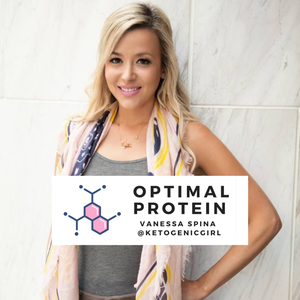 Optimal Protein Podcast (Fast Keto) with Vanessa Spina
Optimal Protein Podcast (Fast Keto) with Vanessa Spina
 The Doctor's Farmacy with Mark Hyman, M.D.
The Doctor's Farmacy with Mark Hyman, M.D.
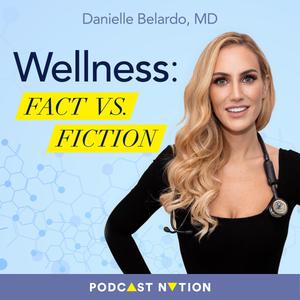 Wellness: Fact vs. Fiction
Wellness: Fact vs. Fiction
 The Dr. Gabrielle Lyon Show
The Dr. Gabrielle Lyon Show
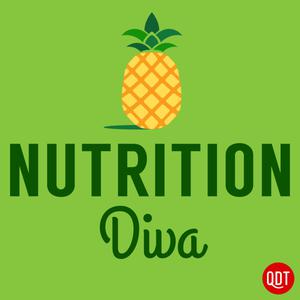 Nutrition Diva
Nutrition Diva
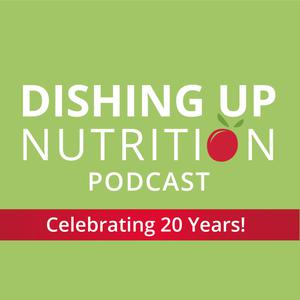 Dishing Up Nutrition
Dishing Up Nutrition